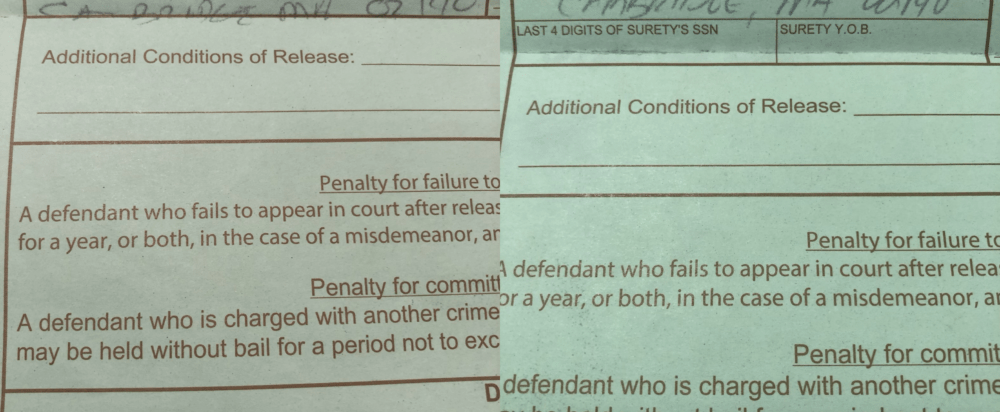Advertisement
Advocates Say New State Forms May Make It Harder To Post Bail
Resume
After a year's worth of meetings, one of the recommendations coming out of the state Legislature's bail reform commission was to make sure guidelines for posting bail are clear and easily accessible. And yet, new changes this year to the process of posting bail surprised not only advocates but also the state senator who co-chaired the bail reform commission.
The two new fields of information added to what's known as a 'recognizance' form, filled out by people paying bail, have advocates and attorneys concerned the updated documentation may have a chilling effect on people who want to post bail.
The nonprofit Massachusetts Bail Fund posts cash bonds of up to $500 for people in the criminal justice system who can't afford to post their own bail.
A volunteer for the group was surprised earlier this month when they were asked at the Bristol County House of Correction to provide the last four digits of their social security number and their year of birth — something they hadn't been asked before.
Atara Rich-Shea, executive director of the Mass. Bail Fund, said these additional fields of information are burdensome and unnecessary.
"It's a piece of information that is private and sometimes not always accessible for people and it also is not relevant to the act of posting bail," said Rich-Shea. "Bail is an amount of money that the court requires someone pay in order to ensure that they come to court, and all the person who is posting the bail is doing is exchanging that money."
Rich-Shea wants to know why the forms are being rolled out with no official announcement, especially in light of the bail reform commission report calling for more clarity around the process.
In an email to WBUR, state bail administrator Catherine Coughlin said the Trial Courts first asked two years ago for the additional information to be collected. It took this long to have the forms printed.
According to Coughlin, the new forms will make it easier for bail magistrates and commissioners to confirm the identity of the person posting bail and make it easier to return that bail money to the right person.
Rich-Shea called the roll out of these changes flawed.
"So far, it has just created confusion and then also potentially fear or misunderstanding," she said.
Immigration attorneys and advocates say the new information fields will have a chilling effect within immigrant communities coming into contact with the criminal justice system. The Massachusetts Immigrant and Refugee Advocacy Coalition was unaware of the changes to the bail forms until notified by WBUR.
Jessica Chicco, a staff attorney at the coalition, said the group always encourages its members to have someone with legal status or a U.S. citizen post bail when it's necessary. But, she recognizes, that's not always possible.
"For an undocumented individual bailing out their spouse, this can be really scary," Chicco said. "That's why it's so important in this age of aggressive and stepped-up [immigration] enforcement for policy makers to really be mindful of how even such a small change might disproportionately impact some vulnerable communities, including immigrant communities."
In an email, Coughlin said bail magistrates and commissioners will be instructed to accept the new forms even without the social security information completed if the person posting bail doesn't want to share it.
But it appears these instructions haven't reached every part of the state.
The Mass. Bail Fund says a volunteer was told just last week at the Hampden County House of Correction that providing the last four digits of a social security number was required to post bail. Other volunteers in Bristol County have been allowed to post bail without including the additional information.
State Sen. Cindy Friedman, who co-chaired a year's worth of meetings of the Legislature's bail reform commission, wasn't aware of the new forms. According to her office, the changes didn't come up during the commission's meetings.
This segment aired on January 29, 2020.
